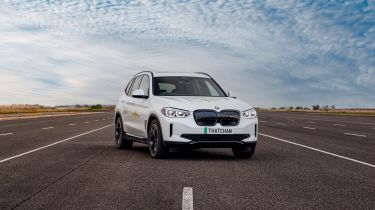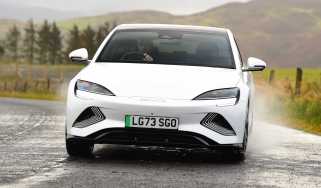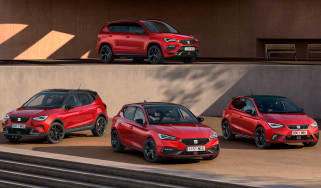BMW tops assisted-driving rankings in latest Thatcham and EuroNCAP assessment
Testers give assistance packages a ‘thumbs up’ despite concerns they could mislead drivers into losing concentration
The BMW iX3 has earned the only ‘very good’ ranking out of seven cars assessed by Thatcham Research for assisted-driving features such as speed assistance, steering assistance and adaptive cruise control systems.
The BMW joins the Audi A8, BMW 3 Series and Mercedes GLE, which received similar ‘very good’ ratings in 2020, while the Cupra Formentor and Ford Mustang Mach E assistance systems have been judged as ‘good’ in 2021. In the latest assessments, the Hyundai Ioniq 5 and Polestar 2 earned only ‘moderate’ ratings, while the Toyota Yaris and Vauxhall Mokka-E assistance technologies are assessed as ‘entry’ level.
Thatcham Research says the results are encouraging, with all seven cars tested this year showing pleasing levels of assisted driving system support.
Of the cars tested in 2021, five are pure electric models. The Thatcham assessments evaluate and rate the level of driving assistance, driver engagement, and safety back-up of their onboard systems.
Matthew Avery, Thatcham Research’s Chief Strategic Research Officer, said: “Assisted-driving technology must strike the right balance between offering a meaningful level of support and ensuring that motorists don’t sit back and let the system do the driving. We’ve seen the dangerous outcomes on roads around the world when drivers become convinced that their role is secondary.”
When Thatcham first started looking at driver-assistance systems, it raised concerns that car makers could be overselling the technology in a way that could be confusing and dangerous to consumers, and it downgraded the Tesla Model 3 to ‘moderate’ as a result.
The organisation says it’s reassured that’s not the case with any of the cars tested this year, with all of the systems being described correctly.
“All seven cars we’ve just tested are clearly marketed as having ‘driver assistance’ functions, not ‘automated’,” said Avery. “These systems are engineered to involve and support the driver in a very cooperative manner. They’re certainly not trying to offer automation, where the driving task can be relinquished to the vehicle, and we strongly believe that’s the right thing to do.
Tester’s comments
Thatcham’s chief research officer Matthew Avery has provided comments on each of the cars in this year’s test:
BMW iX3
“Our top-performing vehicle is the BMW iX3 which is a premium, battery-electric SUV. It's the only vehicle to get our 'very good' grading. It responded well in our collision-avoidance scenarios and at 85%, it has one of the highest scores for Driver Engagement, in part because the iX3 features good in-vehicle video to show the driver how to use the system.”
Ford Mustang Mach-E
“Ford's battery electric Mustang Mach-E achieved a 'good' grading. It's got a very good Safety Backup system which scored 83%, and it has generally well-balanced Assisted-Driving functionality. However, we do think the name of 'Co-Pilot 360' is a little ambiguous and doesn't adequately describe the fact it's an Assisted Driving system that always requires the driver to be in control.”
Cupra Formentor
“The Cupra Formentor is a petrol-powered vehicle with a plug-in option and receives a 'good' grading. The ‘Travel Assist’ name accurately portrays the role of the system, which has well-balanced Driver Engagement, Vehicle Assistance and Safety Backup features. A good option in the market.”
Polestar 2
“The Polestar 2 is another full battery-electric vehicle and it gets a 'moderate' grading. It has an incredibly good score of 85% for its Safety Backup, something you'd expect from a Volvo-derived vehicle. But it's let down by its Vehicle Assistance score, which is just 50%, because the system cannot adapt its speed for curves and junctions. This vehicle is capable of over-the-air updates, and Polestar has already confirmed that it will improve that functionality for all its drivers soon.”
“The Hyundai Ioniq 5 is a brand-new, fully electric car and it achieves a 'moderate' score. It has good Vehicle Assistance and good Driver Engagement. But it's let down by its Safety Backup score of 50%. This means the car is less capable at supporting the driver in an emergency.”
Toyota Yaris
“Toyota's Yaris gets an 'entry' rating, but it's impressive to see Assisted Driving functionality on a low-cost supermini such as this. However, it's let down by its comparatively poor performing Vehicle Assistance and Safety Backup functions.”
“The Mokka-e is the fifth battery-electric vehicle in this year's assessments, but it's also a low-cost one. It receives an 'entry' grading because its Speed Assistance system only uses a camera. This means the information the driver is receiving from the system may not always be reliable.”
2021 Assisted Driving Grading results
| Car | Driver Engagement | Vehicle Assistance | Safety Back-up | Rating |
| BMW iX3 | 85% | 83% | 86% | Very good |
| Ford Mustang Mach-E | 69% | 71% | 83% | Good |
| Cupra Formentor | 70% | 79% | 74% | Good |
| Polestar 2 | 70% | 50% | 85% | Moderate |
| Hyundai Ioniq 5 | 80% | 77% | 50% | Moderate |
| Toyota Yaris | 79% | 56% | 53% | Entry |
| Vauxhall/Opel Mokka-E | 67% | 57% | 44% | Entry |
Find a car with the experts





